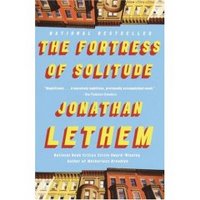[54] The Fortress of Solitude - Jonathan Lethem
 The Fortress of Solitude follows the adolescence years of Dylan Ebdus, a white kid who grows up motherless in downtown Brooklyn, which renders him a minority, in the 1970s. The novel owes its beguiling power in delineating social and private realities not only to the vivid painting of Brooklyn life, which is richly infused with street rhythms, rhymes, sland, and pop lyrics, but also to a close description of a fledging inter-racial friendship that must find a way to negotiate the racial divide. Between his friendship with Mingus Rude, the son of a singer, and his own ethnicity Dylan finds himself striving to cultivate this imaginary "middle space" in which he can preserve his true identity. Surviving the streets to him means more than just conforming to the jargon and the careful slurring of certain words. Rooted somewhere deep heart in the heart is something more than a polyrhythm of fear and panic: a burning desire to be invisible, to be lost in the flow of anonymous faces after school as he leaves the building, hoping to be carried a distance down the street disguised in a clot of bodies before exposing himself as the solitary white boy.
The Fortress of Solitude follows the adolescence years of Dylan Ebdus, a white kid who grows up motherless in downtown Brooklyn, which renders him a minority, in the 1970s. The novel owes its beguiling power in delineating social and private realities not only to the vivid painting of Brooklyn life, which is richly infused with street rhythms, rhymes, sland, and pop lyrics, but also to a close description of a fledging inter-racial friendship that must find a way to negotiate the racial divide. Between his friendship with Mingus Rude, the son of a singer, and his own ethnicity Dylan finds himself striving to cultivate this imaginary "middle space" in which he can preserve his true identity. Surviving the streets to him means more than just conforming to the jargon and the careful slurring of certain words. Rooted somewhere deep heart in the heart is something more than a polyrhythm of fear and panic: a burning desire to be invisible, to be lost in the flow of anonymous faces after school as he leaves the building, hoping to be carried a distance down the street disguised in a clot of bodies before exposing himself as the solitary white boy. Imagine living a life that is not your own anymore because of the standards to which you are constantly demanded to conform, for the sake of safety and survival. In a racial disaster area where one can read the stress in the postures of teachers, cops, security guards, store keepers standing akimbo at the troubled kids, how can a solitary white boy not to cover? How can he not hide under his skin and pine for invisibility? Whereas the man in The Invisible Man laments his under-appreciated and unreognized presence, Dylan longs for that invisibility.
In the checkered lives of the street characters Jonathan Lethem daubs picture of Brooklyn life with the utmost verissimilitude. Tugged in the language of the arresting prose are vestiges of racial politics and class struggle, so inevitably and indomitably that they impervade lives like words carved on stones. No less impressive is the verbal proliferation of the graffiti and tags which compete for ubiquity. The irresistible urge for the lonely art, in the form of the doodling tags, could impart such courage in the kids to purloin industrial ink. Behind the tags are numerous stories nobody would have known and paid attention to--maybe that is why the tags read like secret codes of one's untold history. The incomprehensible and meager progress in school, the desultory air, the learning disability, and lack of discipline are sadly conducive to a cage for growing--a rehersal for prison. The most poignant message from The Fortress of Solitude is confusion of right and wrong. In negotiating between right and wrong, or teetering on the line between what is allowed and forbidden, one realizes a greater and more urgent need to surivive.
1 Comments:
This sounds like a great book. However, if you're looking for a truly interesting and revealing read you really need to check out The Importance of Being Barbra!
...it has changed my life.
Post a Comment
<< Home